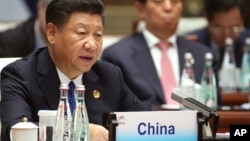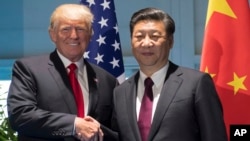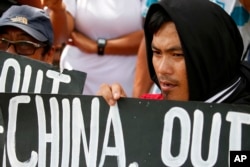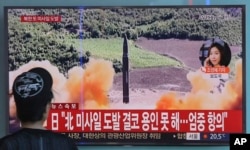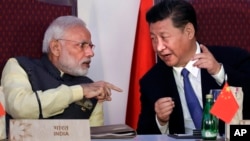Analysts say China’s foreign policy achievements are likely to be a key focus next month when the Communist Party hosts a crucial once-in-five-year leadership meeting. But don’t expect China’s leaders to say much about the challenges and setbacks they’ve faced since Xi Jinping came to power, even though a growing number of some scholars here are doing just that.
Since Xi began assuming leadership in China in 2012, the world’s second largest economy has been rapidly expanding its global footprint and influence. Beijing is engaging and seeking to play a more prominent role in international affairs, while laying out its own initiatives, such as the Asia Infrastructure Investment Bank and the near trillion-dollar trade program, the Belt and Road.
Xi has visited nearly 30 countries, five continents and championed what some here call “Great Power Diplomacy." He has also been advocating what he calls the “China Solution,” Beijing’s proposals and answers to the world’s toughest problems.
The foreign policy focus is so important that some analysts say China’s need to play a more central role in global affairs is likely to be added to the communist party’s constitution during the meeting, along with other changes.
State media recently released a six-party series ahead of the 19th Party Congress on “Great Power Diplomacy.” Advocates of that idea, argue that as a rising great power, China should do what it feels is right anytime and whenever it wishes.
Series of setbacks
However, some analysts say that approach has led to a series of setbacks over the past five years from China’s unilateral declaration of an Air Defense Identification Zone (ADIZ) in the East China Sea to troubles with North and South Korea and more.
“China has failed in all of the South China Sea, East China Sea, China-India border dispute, it’s relationship with South Korea, with North Korea,” said Shen Dingli, a political science professor at Shanghai’s Fudan University. “In one word, China’s good neighbor policy is not welcomed by any of its neighbors.”
Shen said that despite efforts, Beijing has been unable to get North Korea to stop its nuclear and missile development or persuade the South to not deploy the U.S.-based Terminal High Altitude Area Defense (THAAD). Shen and others note that Beijing’s handling of THAAD has not only failed, but pushed Seoul further away and closer to Washington.
China’s ADIZ in the East China Sea has not only been ignored by the United States and Japan, but Russia as well, he adds. And when the International Tribunal at the Hague ruled against China’s claims to all of the South China Sea and its artificial island building there, Beijing was unable to persuade the body on any of the 15 counts, he adds.
“Xi Jinping must understand China has failed. So China has made compromises,” he said. That includes allowing Philippine fisherman to fish off Scarborough Shoals in the South China Sea and not responding militarily to violations of Beijing’s unilaterally declared ADIZ in the East China Sea.
Shen is not alone in his criticism of how policy measures have backfired or failed to achieve their goals.
North Korea
Shen Zhihua, a professor at East China Normal University, has argued that Beijing’s North Korea policy is not only contradictory, but counterproductive. Earlier this year, he noted in an article on the analytical Website Aisixiang that China’s decision to punish South Korea for its deployment of THAAD has pushed Seoul closer to Japan and the United States. He also said it misses an opportunity to forge closer ties with the South, which he calls a “potentially valuable partner.”
In the end, he argues that tensions on the Korean peninsula only serve North Korea and the United States.
And while the West talks about China’s political influence over the North, Shen told VOA that no longer exists.
“North Korea sees China as one of its key enemies. If nuclear war breaks out or there are big changes, the first victim will be China,” Shen said.
Commenting on the border dispute with India, Chinese military strategist Major-General Qiao Liang argued in a recent Global Times article that sometimes it is not just a matter of what is right and wrong.
“We need to understand that it is not always right to do something right at any time. Only doing the right thing at the right time is correct,” Qiao said.
BRICS and beyond
Some analysts say China acquiesced earlier this month so India’s Prime Minister Narendra Modi could attend the BRICS leaders’ summit (which includes Brazil, Russia, India, China and South Africa) in Beijing.
Jean-Pierre Cabestan, a political science professor at Hong Kong Baptist University said the criticisms are growing and more notable than they were under Xi’s predecessor Hu Jintao.
Part of the reason for this, he said, has been the antagonizing approach Xi has taken toward quite a few countries and neighbors in asserting China’s power in the region, be it Japan, South Korea, Vietnam, India or others.
“Apart from the Philippines, which is now having a better relationship with China and other countries which are very dependent on China such as Cambodia and Laos. The rest of the region is more and more worried about China’s empowerment,” he said.
Cabestan added that includes countries that used to be close with China, such as Singapore and Indonesia, which is trying to defend its own maritime rights.
“The other thing is that some of the projects developed by Xi Jinping such as the BRI (the Belt and Road Initiative) have been so ambitious and so political,” Cabestan said. “There is a lack of economic rationale behind that and a lot of money has been invested in these initiatives without exactly knowing if they will be profitable.”
Cabestan said while the party is unlikely to offer any foreign policy criticisms in the Congress report, one key thing to watch will be if it does offer some self-defense of Xi’s initiatives and setbacks.
Joyce Huang, Brian Kopczynski contributed to this report.




